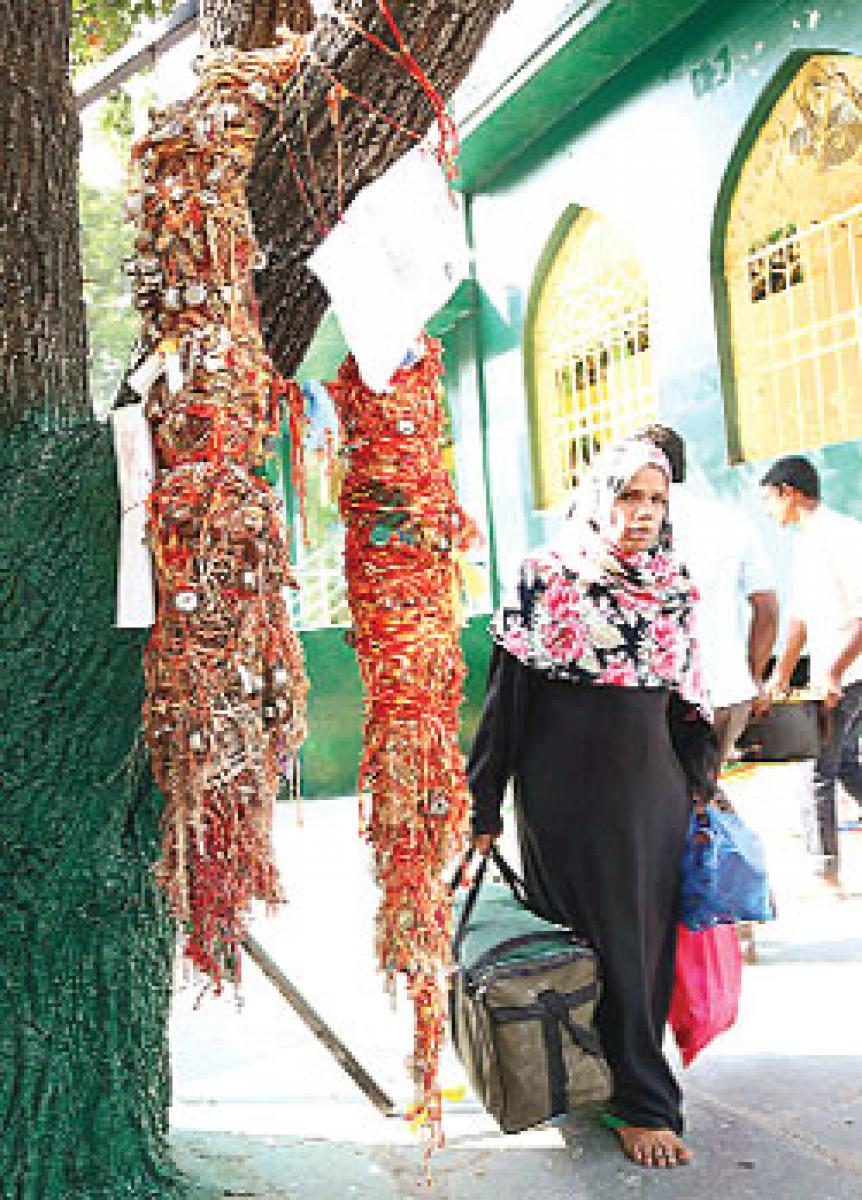Live
- Kishan Reddy Slams Telangana Government, Criticizes Congress and BRS
- Lawyers demand urgent implementation of Protection Act
- Cotton farmers protest fraud in weighing process
- Faculty allegedly rags 1st yr student at Govt Med College
- Mini libraries at tribal welfare hostels soon
- Range-bound trading on positive bias
- Weekly, daily MACD shows strong bearish momentum
- Markets hovering in directionless mode amid lack of triggers
- Epilepsy: Spreading awareness & inspiring support
- Courtroom Drama Udvegam Promises to Be a Unique Cinematic Experience
Just In

As outcry against ‘intolerance’ is making headlines across India of late, historic Kazipet Dargah of great Sufi saint Hazrat Syed Shah Afzal Biabani stands as a living testimony of religious harmony and tolerance.
 Hazrat Syed Shah Afzal Biabani Dargah
Hazrat Syed Shah Afzal Biabani Dargah
Warangal: As outcry against ‘intolerance’ is making headlines across India of late, historic Kazipet Dargah of great Sufi saint Hazrat Syed Shah Afzal Biabani stands as a living testimony of religious harmony and tolerance.
The place is frequented by both Muslims and Hindus alike, also by Christians and Sikhs transcending religious and caste affiliations. They come here to offer their reverence to the Sufi saint in whose memory the Dargah was built.
Testifying the religious tolerance and harmony the place induces in the minds of the devotees, many Hindus become ‘Mureed’ (Person pledging allegiance to the saint as a teacher) after they witnessed miracles in their lives.
“Our lives changed after we visited the place and prayed to the saint,” asserted Suresh Ramchand Kundale and Mohan Ganapati Jadav, who wear skull caps (Kufis) as the Muslims do, indicating their status as Mureed. They hail from Islampur in Sangli district of Maharashtra.
‘We have been visiting the place for the past 25 years and become Mureed four years back’. Becoming a Mureed is not just for getting wishes fulfilled but to become a man of integrity and spirituality. “Being a religious man doesn’t mean to be a Hindu or a Muslim, it is to rise above such things,” they felt.
“If you believe in the saint, then your wish will be granted undoubtedly,” claimed another devotee, Tanaji Bheemrao Pawar of Vitta village in Maharashtra. A Brahmin devotee, Vinayak Rajaram Deshpande, said he has been visiting the Dargah during Urs for the past 50 years. Seeking the blessings from the saint has many ways.
Some tie a thread to a tree on the Dargah premises seeking the saint’s intercession and some place locks if needed a house. The students tie their examination hall tickets to get better marks. The legend says Hazrat Syed Shah Afzal Biabani, born in 1795 AD in Kazipet and considered as saint by birth (Wali Allah).
The name Biabani means residents of desert/forests. At the age of 12 he learnt Holy Quran by heart and left for forests of Papannapet in Medak district to mediate and at the age of 28, he returned to Kazipet. He became the darling of the masses through his teachings and popular among them for his miracles like curing diseases and helping to live a better life.
He strongly opposed exploitation of suppressed classes and upheld human dignity and simple life. He used to write poetry in Telugu besides Persian, Arabic and Urdu. The day he left his physical form on 1856 AD, his followers and devotees raised a Dargah in Kazipet.
It is one among the three Dargahs that are coloured in green in the world. The two others are Ghaus-e-Paak in Baghdad and Madina Munawara in Madina.
The dargah attracts lakhs of devotees from across Telangana, Andhra Pradesh, Maharashtra, Karnataka, Bihar, Dubai, US and others during its annual Urs celebrations.
By James Edwin

© 2024 Hyderabad Media House Limited/The Hans India. All rights reserved. Powered by hocalwire.com







